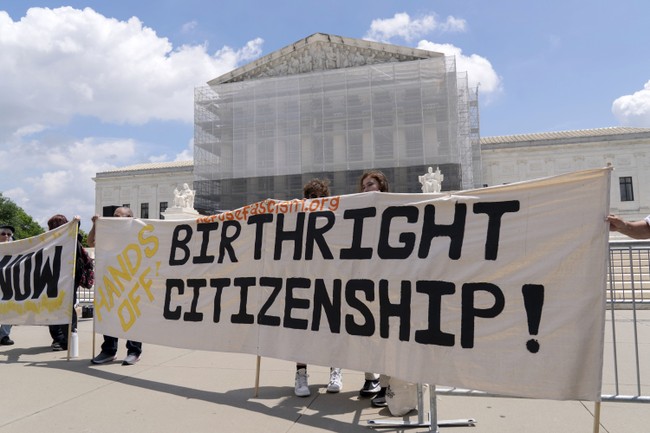
The Supreme Court has ruled in a case involving whether district court judges have jurisdiction to issue nationwide injunctions regarding President Donald Trump’s executive order ending birthright citizenship. The court ruled 6-3 in favor of the Trump administration. The conservative justices ruled for the administration, while the liberals ruled against.
“The court says that universal injunctions ‘likely exceed the equitable authority that Congress has granted to federal courts,'” explained SCOTUSblog’s Amy Howe on a liveblog on Friday.
As my friend and RedState colleague Susie Moore explains, Trump v. CASA is comprised of “three consolidated cases involving President Trump’s executive order regarding birthright citizenship, with the issue being not the substance of the order itself (we’re not there yet), but rather, whether the district court judges who issued injunctive relief in the cases had the jurisdiction to issued nationwide/universal injunctions prohibiting the administration from implementing the order anywhere in the country.”
Related: SCOTUS Allows States to Remove Medicaid Funding to Planned Parenthood
Back in May, oral arguments dealt more with procedural issues than the merits of the case. Howe wrote that the arguments didn’t appear to lead to a conclusive decision:
The Supreme Court on Thursday was divided over whether a federal judge has the power to block President Donald Trump’s executive order ending birthright citizenship while the case moves through the lower courts. The Trump administration told the justices it should be able to at least partly implement the order. Although several justices in recent years have expressed skepticism about so-called nationwide injunctions, which bar the government from enforcing a law or policy anywhere in the country, during more than two hours of oral arguments, it was not clear whether a majority of the justices were ready to bar such injunctions altogether.
“The question whether Congress has granted federal courts the authority to universally enjoin the enforcement of an executive or legislative policy plainly warrants our review, as Members of this Court have repeatedly emphasized,” wrote Justice Amy Coney Barrett in her majority opinion.
“It is easy to see why,” she continued. “By the end of the Biden administration, we had reached ‘a state of affairs where almost every major presidential act [was] immediately frozen by a federal district court.’”
Barrett concluded that “federal courts do not exercise general oversight of the Executive Branch; they resolve cases and controversies consistent with the authority Congress has given them. When a court concludes that the Executive Branch has acted unlawfully, the answer is not for the court to exceed its power, too.”
Ostensibly, this ruling applies to the executive order about birthright citizenship, but Susie told me on Thursday that the ruling “could be instructive as to how they’re inclined to address them in those other contexts.” We’ll have to see what the implications of this decision will be. Stay tuned.
Stay Ahead of the Story – Join PJ Media VIP
The stakes in America have never been higher. With unprecedented developments surrounding the Supreme Court and the Trump administration, you need more than headlines—you need real insight.
PJ Media VIP gives you the most comprehensive, unfiltered coverage of what’s really happening in Washington. Our team is on the front lines, cutting through media spin to bring you analysis and truth you won’t find anywhere else.
Now’s the time to get informed—and get involved.
👉 Use the promo code FIGHT and get 60% off your PJ Media VIP membership today.
Don’t just watch history. Understand it. Be part of it. Join PJ Media VIP.












